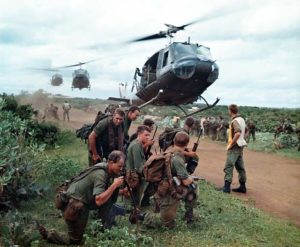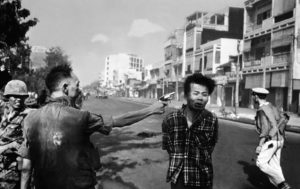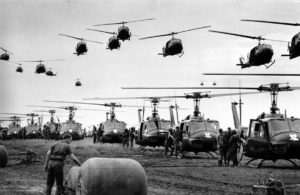
Oh, how I love public television.
Americans are going to receive, via what looks like a spectacular PBS documentary series, a history lesson for the ages.
The subject: The Vietnam War.
Documentary filmmaker Ken Burns has assembled yet another masterpiece that airs beginning on Sept. 17 on Panhandle PBS. I just watched a 30-minute preview of the multi-part series. I have a few thoughts to share about it … and about the series that I want to urge all Americans to watch.
Burns calls the Vietnam War the nation’s “second civil war,” in that it tore this country apart to a degree not seen since the actual Civil War that was fought from 1861 until 1865. Perhaps just like the Civil War, this nation hasn’t yet come to grips fully with what happened here while young Americans were dying in a foreign land.
My interest in the series, of course, is quite personal. I was one of about 3 million Americans who went to Vietnam. My tiny contribution to that effort as an Army soldier is not worth detailing here. I went there, came home — and was privileged to return to Vietnam two decades later on assignment with a group of journalists.
My major takeaway from the return to Vietnam in 1989 was that I shed some emotional baggage that I never even realized I was lugging around. Perhaps this PBS series will allow other Americans to do the same thing.
Burns and his crew interviewed American veterans, South Vietnamese veterans, Viet Cong fighters, North Vietnamese veterans. One former VC soldier tells how he witnessed American soldiers weeping over their dead comrades. He said he realized then that “those Americans are just like Vietnamese,” in that both sides had a shared sense of humanity.
One of Burns’s producers talked about the music of that era, calling it “the best music in American history.” Yeah! Do you think?
The Kent State riots in Ohio in 1970, according to one of the historians interviewed, symbolized the fracture among Americans. “They were kids on both sides; National Guardsmen and student protesters,” he said.
And, oh yes, how did some of those who protested the war treat those who returned from that battlefield? Not well. One of them expresses profound sadness over calling these warriors “baby killers and worse.” That has changed as Americans today profess profound gratitude for the young men and women we send abroad in defense of our nation.
This Vietnam veteran is filled with gratitude for that change.
Burns believes that PBS is the only network in the nation that could present a series such as the Vietnam special that will air in a few weeks.
Thus, I am grateful beyond measure as well for public television’s willingness to teach us what we need to learn about this important chapter in our nation’s ongoing story.



